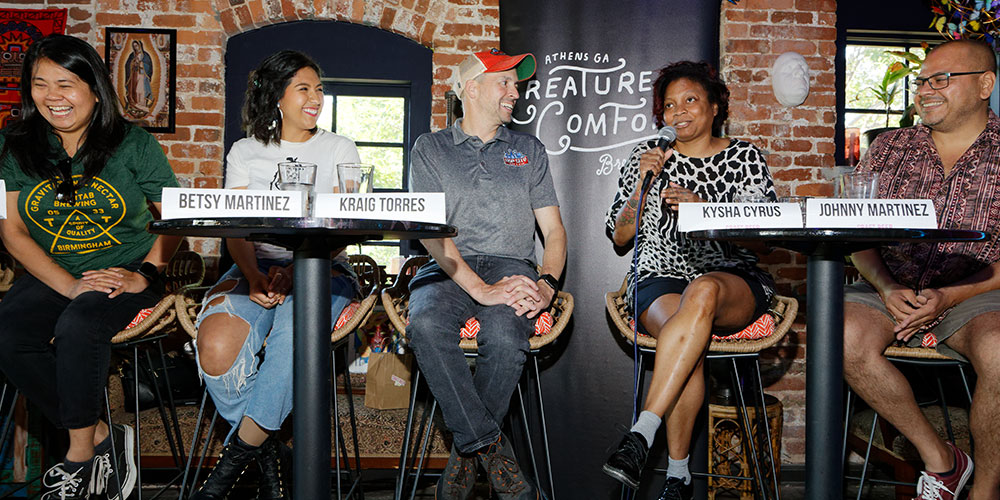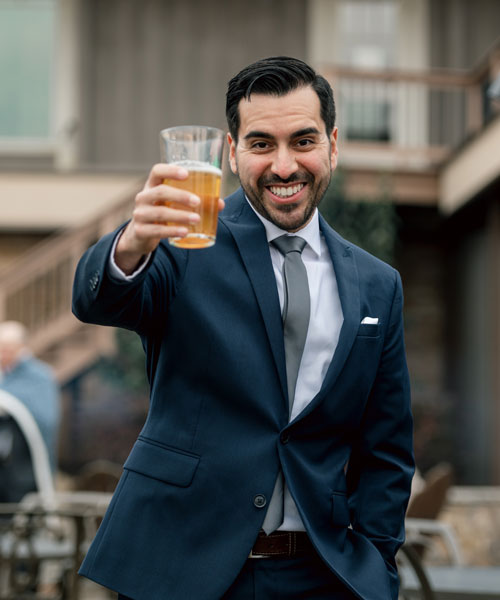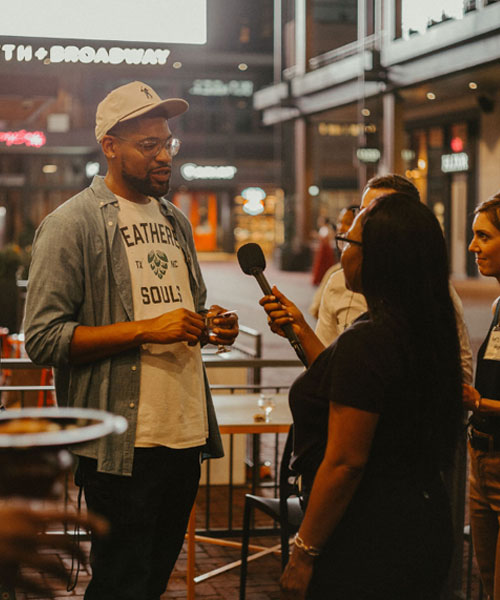The Brewers Association (BA) Diversity, Equity, and Inclusion (DEI) Mini-Grants Program awards grants to support local and regional events, media production projects, and educational and training initiatives that thoughtfully and intentionally promote and foster a more diverse, equitable, and inclusive craft beer community.
The BA Philanthropy and Outreach Subcommittee reviews proposals from individuals and organizations on a rolling basis from November 1 to October 31 each funding year. Since the inception of the program in 2019 (formerly under the name Diversity & Inclusion Event Grants), over $170,000 in grant funding has been dispersed to event organizers, media producers, and educators across the country.
While assembling and submitting a proposal for the DEI Mini-Grants program isn’t difficult, it has multiple components, and event planners, media producers, and education providers who have not previously applied for a grant might find the process daunting. To help those who have questions, we’ve asked a group of past grant awardees for tips and best practices that can be used by future applicants to make their proposals stronger.
Keep the BA Mini-Grant Program’s Strategic Goals Top of Mind
The DEI Mini-Grants Program has five strategic goals:
- Increase access to and responsible appreciation of craft beer for underrepresented populations and those who have experienced barriers to accessing the broader craft brewing community.
- Promote employment and ownership opportunities in the craft brewing community for members of underrepresented populations and those in the craft brewing community who have experienced barriers to access and advancement.
- Celebrate the diversity of the craft brewing community and increase the visibility of underrepresented groups and experiences.
- Develop cultural competence and increase the adoption of diversity, equity, and inclusion best practices among members of the broader craft brewing community.
- Leverage the strengths of the craft brewing community to fight injustice, eliminate disparities, and provide solutions to an array of challenges that impact those who produce and enjoy craft beer.
BA Equity & Inclusion Partner J Jackson-Beckham says that these goals should be top of mind for anyone preparing a grant proposal. “I can’t stress this strongly enough for those who are assembling proposals,” says J. “Make it super clear which of the program’s strategic goals your event, media production, or educational initiative will accomplish. If the committee can’t see how your project accomplishes at least one of the program’s goals, your proposal won’t be funded.”
Jackson-Beckham also stresses that grant proposal guidelines aren’t “themes or suggestions.” Rather, they should be thought of as a checklist that grant applicants must use to ensure their proposals are complete. “Don’t be afraid to use the guidelines like a worksheet. Use headings and sections to show the selection committee exactly how you are meeting the published guidelines point by point. There are lots of times and places to get creative, but writing a DEI Mini-Grant proposal isn’t one of them.”
Take Advantage of Opportunities To Collaborate
Tranice Watts and Ashlie Randolph, Lifting Lucy
Tranice “Tre” Watts, a co-founder of Lifting Lucy, said being intentional about events with respect to partnerships and support was something they emphasized in their successful grant proposal for the Women of Brewsters Place Beer Brunch in Charlotte, North Carolina that was supported by a grant in the spring of 2022. Lifting Lucy also collaborated with organizers of All The Way Up! A DEI Celebration, an event held at Peabody Heights Brewing in Baltimore, Maryland later the same year.
“I think we were great with leveraging our network and listening to what was going on in the towns and streets and saying, ‘How can we leverage that opportunity?'” Watts said.
Ashlie Randolph, Lifting Lucy co-founder and executive director, explains how partnering with local organizations and city offices helps to expand the scope of their events. “Hosting our own events, that’s one way that we can increase that access, but when it comes to those educational opportunities, it’s very important, as Tre said, that we are reaching out to those movers and shakers, to those resources, such as economic development and tourism offices.”
Demonstrate How Your Project Meets the Needs of the Intended Audience
Jen Price, Crafted For Action
The Crafted For Action Craft Beer Con is a hybrid, action-oriented conference that seeks to foster robust discussions, incubate ideas and up-and-coming business, and develop real solutions that can create lasting change in the beer community. Crafted For Action has been awarded a DEI mini-grant twice, in 2021 and 2022, as it has grown in size and scope. Price emphasizes that those developing proposals for a grant should take care to demonstrate how their project meets the needs of the intended audience.

“Discover where there’s a gap in the market. Where do you not see things happening? Who’s not being served? Who’s not being addressed? Find where your opportunity is and what can set you apart. It can be small; it doesn’t need to be a conference. Start small and scale up.”
Make the Case That You Can Successfully Complete Your Project
Mickey Bryant, Black and Brew Chicago

Black and Brew Chicago is a charitable nonprofit organization advocating for equity and inclusion in the craft brewing industry through community outreach, education, and employment opportunities. Black and Brew works with local breweries to host learning experiences. Founder Mickey Bryant has a background in instructional design and is a training developer and a facilitator.
Bryant utilizes a range of educational materials in Black and Brew’s All About Craft Beer: Education, Employment & Enjoyment course. Materials are tailored to the client and students, highlighting how diverse communities contribute to the greater craft beer community. Customizing learning materials can be expensive, so being awarded grant funds was a boost to Black and Brew’s mission. Bryant believes that her demonstrated experience in producing educational materials was a significant boost to her proposal and encourages others to highlight their strengths, skills, and focus.
Quantify Past Successes
Christian Mercado-Acevedo, The Food Engineer
Christian Mercado-Acevedo was able to add a video component to his audio-only Spanish language podcast, The Food Engineer with the assistance of a DEI Mini-Grant. Mercado-Acevedo thinks his application had several strengths people should take into consideration.

“One of them is that it was well-informed and well-researched,” Mercado-Acevedo said. “So, the first thing I did was I sat down and looked at previous winning grants or grant applications. I also went in and looked at every single rule in the book for this program. And I made sure that my application ticked every single box.” Mercado-Acevedo was meticulous, adhering to each section of the grant application stipulations.
“I want to say that another part…is showing a track record of what you have achieved so far,” he added. “And use it to leverage your ability to do the job that you’re proposing to do. Because if I had not had previous experience with podcasts…It could leave a certain space for doubt. How can you do that if you’ve never done it before?” He included where his podcast is available in his proposal, how many downloads it had, and a detailed cost breakdown for what it would take to add a video component to his podcast.
Paint a Vivid Picture of Your Project
Marco Ortega, Black is Beautiful Documentary

“A shot in the dark” is how Marco Ortega, a video producer based in San Antonio, Texas, described the DEI mini-grant proposal for his documentary film project. Ortega produced a documentary about San Antonio’s beer scene nearly a decade ago. However, he was awarded a grant for Black is Beautiful: A Short Film (2023), a documentary about the highly successful collaborative brewing initiative of the same name created by Marcus Baskerville of Weathered Souls Brewing Co. The documentary was screened for an enthusiastic audience at the Craft Brewers Conference in Nashville earlier this year.
Ortega said you need buy-in from people who are looking over your proposal. “I just wanted people to really understand the feeling behind it,” Ortega said. “So, you know, describing the project in detail, having a theme for the project, stating the goals of the project, and then the scope. People are going to care about the emotional buy-in that is associated with your project.”
Pay Attention to Details and Ask for Assistance From BA Staff
Joe Mettle and Roger Apollon Jr., Entrepreneurship and Equity in Brewing
Jackson-Beckham says that the project budget is frequently the weakest section of DEI Mini-Grant proposals. “Decisions sometimes come down to two very critical details: the requested grant amount and the project budget.” The DEI-Mini Grants Program funds up to 25% of total project costs, up to maximum of $5,000. “Receiving proposals that request more than 25% of their total project costs or whose budgets appear to be constructed so that expenses equal exactly $20,000 are definite red flags.” She urges applicants to take the time to create thoughtful, realistic, and complete budgets for their events, media projects, or educational initiatives.
She offers the following recommendations:
- Do your best to find real estimates for your expenses. Call around and get quotes or talk to others who have successfully completed projects like yours. Event organizers can often lean on their state brewers guilds for this kind of information.
- Don’t assume that any cost is “too small” to itemize. Detailed budgets demonstrate to the subcommittee that you have invested time and effort into understanding what it will take to execute your project.
- If you are organizing an event that will sell tickets or sponsorships; producing a media project that will sell content, subscriptions, or merchandise; or creating educational curricula that will charge for enrollment, make sure you show projected income as well as expenses.
If applicants have questions about how to put together budgets or about any other requirement of the proposal process, they are encouraged to contact BA staff. Joe Mettle, a former New Jersey charter school teacher, who co-founded the Entrepreneurship and Equity in Brewing (EEB) program, says, “You’re creating an idea from scratch, but to fully formulate it, you need input from different entities and different ideas.” Staff members at the BA, like former program director Alana Koenig-Busey, were instrumental in helping EBB assemble a successful proposal.
Explain What Impact Grant Funding Will Have On Your Project
Jackson-Beckham says another frequently missed opportunity on unsuccessful proposals is failing to show how grant funding will have an impact on the project.
“We’re looking to support projects where a modest financial boost in the form of a mini-grant will have a tangible impact on the success of the event—specifically, how it will more successfully meet one or more of the grant program’s funding goals.” She adds, “If you can reasonably estimate that grant funding will help to bring 500 additional people from underserved populations to your event that wouldn’t be there if you did not receive the grant, make that case. If you can show that a grant will allow your educational program to add 30 qualified workers to the local craft brewery employment pipeline that it would not be able to without the grant, make sure the subcommittee understands that fact.”
Lean On Past Success and Go For It!
Caroline King, Bitch Beer Podcast
Bitch Beer Podcast is the brainchild of Caroline King, focusing on women in the craft brewing industry. The podcast celebrated its fifth anniversary in March and is now evolving into a film travel show set to premiere on Hulu sometime next year. King applied for a DEI mini-grant after hearing about the program from Jackson-Beckham after she appeared as a guest on the podcast.
King said the grant is an involved process and to “make sure you read the questions carefully and you’re very thoughtful with your answers, not just giving something generic.” She adds, “Imposter syndrome is the killer of dreams. Just go for it!”
Submit a Proposal for a DEI Mini-Grant
All event organizers, media producers, and educational and training curriculum builders in the craft brewing industry are encouraged to explore the guidelines of the BA DEI Mini-Grant Program, especially those who are committed to growing the craft brewing community to include new members. Funding has been undeniably helpful to past awardees, but many find validation in having their industry peers on the BA Philanthropy and Outreach Subcommittee support their projects.
“The Brewers Association is the preeminent group in craft beer and our industry, and to be recognized by them is a feather in the cap.” Jen Price said. “Being supported by the BA is a huge endorsement.”
Christian Mercado-Acevedo echoes those sentiments. “I feel very fortunate that I was selected because…it means that the work that I’m doing has gained enough visibility that it has the trust of the association.”
All individuals and organizations are eligible to apply for a BA DEI Mini-Grant. Proposals for the 2023 funding cycle will continue to be accepted on a rolling basis through October 31, 2023. All questions and inquiries related to the DEI Mini-Grants Program should be directed to Dr. J Jackson-Beckham at drj@brewersassociation.org. View program guidelines, browse a list of past recipients, and submit proposals on BrewersAssociation.org.

Because Your Business is More than the Liquid.
Get news, resources, tools, and more to help your team THRIVE.







 Resource Hub
Resource Hub